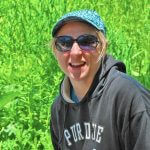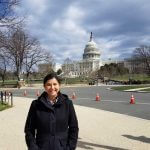Season Martin
Boulder, Colorado
At the time of this interview, Season Martin was the water projects and sustainable finance director for The Nature Conservancy’s Colorado River Program. At TNC, Season was working on market-based approaches to restoring healthy river flows in the Colorado River basin, where water supplies are shrinking due to drought and warming while demand continues to rise. Here, she explains how water markets and impact investment can help save the river. Season is currently serving as the Co-Founder and Partner at Martin & McCoy.
This interview was conducted by Carly Schmidt on August 30, 2018. Learn more about The Nature Conservancy’s Colorado River Program.
Did you grow up around water? Where? What are your fondest early memories of rivers, lakes, or streams?
I grew up in Grand Junction, Colorado, and I had the fortune of being part of a family that loves rivers. From the time I was young I went on river trips throughout the southwestern United States. I have fond memories of weekends spent on desert rivers in the southwest. Our go-to river was the Dolores River in the springtime.
Did any of these early experiences inform your decision to become a conservationist?
There are two parts to my realization story. The first piece is my parents, who were always into rivers and always talking to me about how we lost Glen Canyon. This story was a theme throughout my childhood. We talked a lot about what it meant to lose those places, and that really inspired me to think about how I can prevent that or manage our human-based systems in a different way.
The second piece was growing up on the Dolores River. In high school and college, the river got to the point where there wasn’t enough flow to allow use of the river for recreational purposes. I saw the flow loss over my childhood and the water slowly disappeared. Both of these things led me to engage in natural resources in the southwestern U.S.
Why is protecting rivers and water important to you now?
I see systems that were designed 100 years ago during a time focused on development of the West, and I think that at this point these systems need to adapt to the current cultural desires of where we want to see western society go. Now is a really interesting time where we have the opportunity to engage in conversations and drive solutions to water degradation that are done in such a way where they don’t hurt our economies. It is exciting to me now, aside from wanting water in rivers to play, that we can change the way our economy works to support rivers and watersheds.
What does being a part of River Network mean to you?
River Network has given me a community and connection. What I lose in the day-to-day is why I am excited about this work, and River Rally has been a place to see incredible people doing work across the U.S. It’s inspiring. I feel part of a community that is ever expanding and ever changing. I have been to Rally almost every year for six years.
What water-related accomplishment are you most proud of?
It’s more of a shift in perspective more than an accomplishment … but I believe that solutions need to involve participation from every community that is impacted, versus the historical way of driving solutions through big water users and big agencies. One thing I’ve been working on is engaging tribal interests and engaging tribes in a way that is respectful and putting enough resources and time towards that inclusion. I have seen a shift internally within some colleagues in the Colorado River Basin. We are changing the way we engage with other communities in the Colorado River Basin.
What positive changes would you like to see for water in your community over the next 10 years?
I define my community as the Colorado River Basin. I work with all kinds of stakeholders including tribes, agriculture, water users, and hydro. I would like to see us move away from everyone in their corners, holding on to what they think is right, to acting collectively for the benefit of everyone. We can do this through solutions that benefit the collective, but we need to move from every action being driven by the intent to protect what we have.








